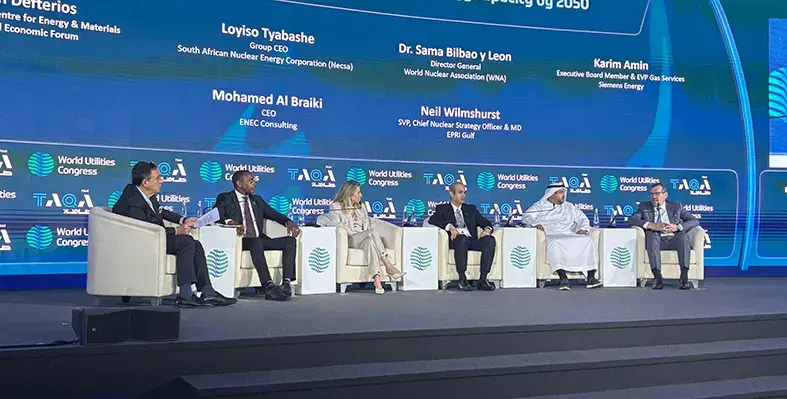The UAE has emerged as a global leader in nuclear energy deployment, showcasing a remarkable journey of strategic vision, technological innovation, and commitment to sustainable development.
This success was highlighted at a panel discussion during the World Utilities Congress, held in Abu Dhabi.
Mohammed Al Braiki, general manager, ENEC consulting vice president, ENEC Strategy, emphasised the country's transformative approach.
"We were ambitious, bold, and committed," he stated, reflecting on the nation's nuclear journey that began in 2009.
The Barakah Nuclear Energy Plant now supplies 25% of the UAE's electricity, avoiding 22.4 million tons of CO2 emissions, which is equivalent to taking four million cars off the road.
What sets the UAE's approach apart is its comprehensive strategy. The country has not just built nuclear infrastructure but created an entire ecosystem around it. "We invested a lot in outreach programs," Al Braiki explained, highlighting their commitment to public education and acceptance. Remarkably, the program maintains an 85% public acceptance rate, a testament to transparent communication and strategic implementation.
The global nuclear landscape is undergoing a significant transformation. Dr. Sama Bilbao y León, director general of the World Nuclear Association, noted the industry's newfound pragmatism. "It's simply not possible to reach Paris Agreement goals, energy security, and economic development without nuclear energy," she emphasised.
The timing couldn't be more critical. With the rising demands of artificial intelligence and data centers, nuclear energy is becoming increasingly attractive. Mohammed Al Braiki shared a striking projection: data center power consumption could grow from 2.5% of global power in 2025 to 8% by 2035, creating an unprecedented need for stable, clean energy sources.
The UAE's success extends beyond electricity generation. The nuclear program has created a robust industrial ecosystem, with $4.9 billion localised in supply chains. Companies are now exporting expertise and components to nuclear projects in the UK, Korea, and beyond.
Internationally, the nuclear renaissance is gaining momentum. Thirty-one nations have pledged to triple nuclear capacity, with 14 major banks committing to support this expansion.
Dr. Bilbao y León captured the essence of this transformation. "We are not just building power plants; we are creating an entire ecosystem of clean energy professionals," she said.
Other perspectives
Karim Amin, board member, Siemens Energy, said, "Nuclear energy is not a stop and go technology. We need to show it's not just a technology, but an important pillar for climate resilience, energy sovereignty, and economic development. If we communicate properly, we will find traction with the younger generation."
Neil Wilmshurst is SVP, Chief Nuclear Strategy Officer and MD of EPRI Gulf, along with being chair - U.S. Member Committee, World Energy Council.
"We need to change how we communicate about nuclear energy - stop apologising and start leading with its benefits. The dream is to have common codes and standards across the world, which would rationalise components and make supply chain management more efficient," he said.
Loyiso Tyabashe, group CEO South African Nuclear Energy Corporation (Necsa), said, "The nuclear industry has been very good at talking to itself, and it's time to broaden the conversation. Advocacy is crucial, where we show the pros and cons of the technology, just like any other technology. We need to engage academia, industries, and influential community members to change perceptions."







